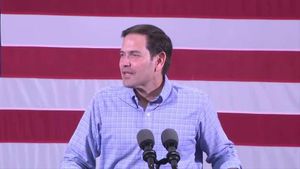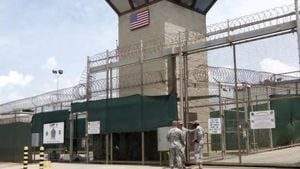BANGKOK, Thailand – The Thai Criminal Court has granted former Prime Minister Thaksin Shinawatra permission to temporarily leave the country, marking his first international travel since returning from 17 years of exile. This unprecedented decision, made on January 31, allows Thaksin to attend meetings related to his role as adviser to Malaysia's Prime Minister Anwar Ibrahim during its ASEAN chairmanship.
The court specified travel dates from February 2 to 3, requiring Thaksin to post a bail of 5 million baht (approximately $145,000) as assurance for his return. Thaksin testified at the hearing, supported by Foreign Minister Maris Sangiampongsa, who provided documentation validating Thaksin's necessity to travel for diplomatic purposes. According to the court's ruling, this trip is deemed beneficial for international relations, even though the details of the meetings remain vague.
Thaksin, 75, stated to reporters, “I am going for a meeting, not for a vacation,” as he exited the courtroom, emphasizing the professional obligations tied to his travel. This trip signifies his continuing engagement with ASEAN, following his appointment by Prime Minister Anwar Ibrahim as one of his informal advisers.
The approval for Thaksin to leave the country is particularly significant considering his contentious legal battles. After returning to Thailand two years ago, Thaksin faced jail time on corruption and abuse of power charges, which had resulted in eight years of imprisonment before the king granted him clemency six months later. He is currently entangled with legal proceedings related to lese-majeste law due to comments he made to South Korean media nine years ago, with his trial scheduled to begin this coming July.
Thailand's stringent lese-majeste laws impose severe penalties for insulting the monarchy, contributing to Thaksin's complex legal life. Critics suggest these regulations are frequently exploited to suppress dissent and stifle legitimate political discourse. Timely departures for officials grappling with such charges, particularly to discuss regional security and cooperation, remain rare exceptions.
Despite voicing intentions to remain out of the political spotlight upon his return, Thaksin has continued to rally support for his former party, Pheu Thai, indicating his sustained influence within Thai politics. He defended his controversial casino entertainment complex proposal against opponents who claim it solely promotes gambling, iteratively clarifying, “less than 10% of the complex’s activities would involve gaming.”
Thaksin’s court-approved temporary departure raises questions about the intersection of law, governance, and international diplomacy within the Royal Thai regime. How the government balances its legal framework with diplomatic relations is under scrutiny as Thaksin navigates through his obligations both nationally and internationally.
With the promise to report back to authorities within three days of his return from Malaysia, Thaksin's future engagements continue to spark conversation among citizens and observers alike. The court's decision has highlighted the delicate balance of power and legality within Thailand, juxtaposed against the backdrop of rapid regional development and shifting political landscapes.
The upcoming months seem pivotal, especially with Thaksin’s trial around the corner and myriad doubts surrounding the effectiveness and reach of Thailand's austere lese-majeste law. Will his diplomatic engagements bolster his reputation or exacerbate existing tensions within the political arena? Only time will tell, as Thaksin continues to play his cards amid legal challenges and changing times.



